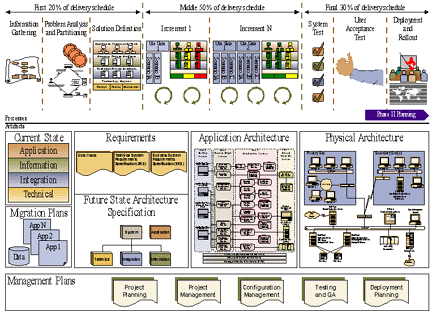|
Aaramb's 3 stage Solution Delivery Architecture.

Stage 1 - Analysis, Specification and Prototype
The first stage is to find out the customer’s needs and requirements
and to design a prototype and an object model, as well as data structures
and communication protocols for a new system.
The deliverables of this stage are:
 Specification for a new system,
Specification for a new system,
 Project Plan with timetable and costs,
Project Plan with timetable and costs,
 Screen Prototype of a new system,
Screen Prototype of a new system,
 Object Model and Database Structure of a new system, if required.
Object Model and Database Structure of a new system, if required.

The Specification allows getting complete understanding of the
functionality required. The Project Plan shows necessary investments
and eliminates the risk that the system will never be finished -
the major problem of the custom software development industry. The
Screen Prototype, the Object Model and the Database Structure allow
the customer staff members to review the future system and to give
their feedback. It makes possible to avoid any mistakes in the system
design and to plan the future transition period and staff training
if required. Usually this stage is based on a separate contract.
And we never insist on continuation of the project because after
this stage the customer understands the investments required better
and may postpone the development, or discovers the necessity of
wider or different functionality, or decides to use his/her own
staff or other organisation for development. In any case, the customer
has valuable products as a result of this stage. The stage usually
takes from 1 up to 4 months dependently on the project. The most
important thing is that this stage solves several global problems:
Exact definition of what is going to be developed and how much it
costs,
Establishing confidence between us (you see our abilities in practice!),
It significantly lowers or eliminates at all the risk at both sides.
Stage 2 - System Development
Once the Specification, the Project Plan, and the Prototype have
been accepted and approved by the customer, the software development
is initiated.
The deliverables of this stage are:
 Regular monthly or every other week deliveries of the code developed,
Regular monthly or every other week deliveries of the code developed,
 Test Plan,
Test Plan,
 Acceptance Testing Criteria,
Acceptance Testing Criteria,
 Testing Reports,
Testing Reports,
 Testing Scripts,
Testing Scripts,
 Labour Accounting Worksheets and Status Reports (if required)
Labour Accounting Worksheets and Status Reports (if required)
 Project Plan Updates,
Project Plan Updates,
 System and Source Code Documentation,
System and Source Code Documentation,
 User’s Guide (optional),
User’s Guide (optional),
 Online Context-Sensitive Help (optional),
Online Context-Sensitive Help (optional),
 Integrated Software Product installed in a test mode,
Integrated Software Product installed in a test mode,
 Installation program and instructions.
Installation program and instructions.
Stage 2 is usually a fixed-price contract. Also, we recommend
participation of one of our developers at the customer's side on
a time and materials basis for on-site support, integration, installations
and training. During the entire development the customer has tight
control of the project and can even make small enhancements or changes
to the system.
Stage 3 - Installation, Integration and Training
The final stage of system development is to move the product from
test mode to the production environment with conversion of existing
data, if it is necessary. Our staff and future users will install
and test the system. Their comments are key in making any final
changes and verifying operation. When the tests show that the product
is operating in accordance with the specification, end users will
be trained. The software product will be installed in production
mode.
The development team will continue to support the customer after
installation completion. Besides we provide six-month warranty during
which we will eliminate any bugs found free of charge.
Stage 3 is conducted on a time and materials basis.
This Solution Delivery Architecture gives our customers several
advantages:
 Development of systems conjointly with your company
Development of systems conjointly with your company
 Developing a solution that exactly meets your needs
Developing a solution that exactly meets your needs
 Delivering a quality product on time and to budget, at no risk for
your time and money
Delivering a quality product on time and to budget, at no risk for
your time and money
 Utilising existing information systems, hardware and software wherever
possible
Utilising existing information systems, hardware and software wherever
possible
 Utilising packaged software wherever possible
Utilising packaged software wherever possible
 Purchasing new hardware and software stepwise
Purchasing new hardware and software stepwise
Please contact us for more
information or if you have any questions
|

